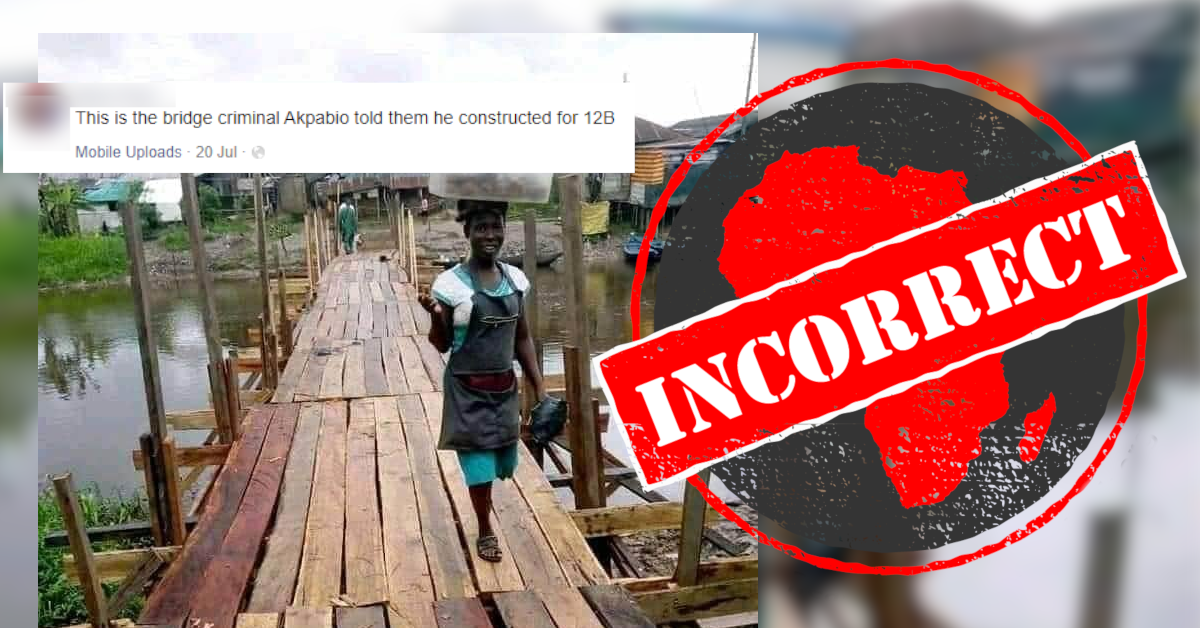A photo of a narrow wooden bridge across a river, seemingly hand-made from roughly hewn planks, was posted on Facebook in Nigeria on 20 July 2020.
“This is the bridge criminal Akpabio told them he constructed for 12B,” its description reads.
Godswill Akpabio heads the Ministry of Niger Delta Affairs, which is responsible for the socioeconomic development of the oil-rich southern Nigerian region. The post claims Akpabio said he built the bridge for N12 billion (about US$30 million).
The photo has also appeared on blog pages with the claim the bridge is in Elebele, a community in Bayelsa, one of the core states in the Niger Delta. The blogs say it was built by the Niger Delta Development Commission (NDDC) at a cost of N2.3 billion.
The commission was set up to develop the region, but its management of funds has recently been subject to a parliamentary probe.
Did the ministry or NDDC spend billions of naira on this wooden bridge?

Africa Check has found no evidence that the minister said the wooden bridge was built for N12 billion. And no credible media outlet has reported that the ministry or the NDDC spent billions on any bridge in Elebele.
The commission has denied the claims.
In a 24 July article headlined “N2.3 billion Bayelsa wooden bridge fake news – NDDC”, the Nation newspaper quotes Charles Odili, the NDCC’s corporate affairs director, as saying there is no record of the commission building a bridge in Elebele.
“We have gone through our records for the past 18 years and there is even no contract offer for the construction of a bridge in the community,” he reportedly said.
“Elebele community in 2018 sought assistance from the Commission to rebuild the bridge which had collapsed. The proposal is still going through our system and presently at the design stage.
“While awaiting NDDC’s intervention, the community undertook self-help and built the wooden bridge. No NDDC input.” – Motunrayo Joel
“This is the bridge criminal Akpabio told them he constructed for 12B,” its description reads.
Godswill Akpabio heads the Ministry of Niger Delta Affairs, which is responsible for the socioeconomic development of the oil-rich southern Nigerian region. The post claims Akpabio said he built the bridge for N12 billion (about US$30 million).
The photo has also appeared on blog pages with the claim the bridge is in Elebele, a community in Bayelsa, one of the core states in the Niger Delta. The blogs say it was built by the Niger Delta Development Commission (NDDC) at a cost of N2.3 billion.
The commission was set up to develop the region, but its management of funds has recently been subject to a parliamentary probe.
Did the ministry or NDDC spend billions of naira on this wooden bridge?

‘No contract for bridge in Elebele’
Africa Check has found no evidence that the minister said the wooden bridge was built for N12 billion. And no credible media outlet has reported that the ministry or the NDDC spent billions on any bridge in Elebele.
The commission has denied the claims.
In a 24 July article headlined “N2.3 billion Bayelsa wooden bridge fake news – NDDC”, the Nation newspaper quotes Charles Odili, the NDCC’s corporate affairs director, as saying there is no record of the commission building a bridge in Elebele.
“We have gone through our records for the past 18 years and there is even no contract offer for the construction of a bridge in the community,” he reportedly said.
“Elebele community in 2018 sought assistance from the Commission to rebuild the bridge which had collapsed. The proposal is still going through our system and presently at the design stage.
“While awaiting NDDC’s intervention, the community undertook self-help and built the wooden bridge. No NDDC input.” – Motunrayo Joel
Republish our content for free
For publishers: what to do if your post is rated false
A fact-checker has rated your Facebook or Instagram post as “false”, “altered”, “partly false” or “missing context”. This could have serious consequences. What do you do?
Click on our guide for the steps you should follow.
Publishers guideAfrica Check teams up with Facebook
Africa Check is a partner in Meta's third-party fact-checking programme to help stop the spread of false information on social media.
The content we rate as “false” will be downgraded on Facebook and Instagram. This means fewer people will see it.
You can also help identify false information on Facebook. This guide explains how.





Add new comment